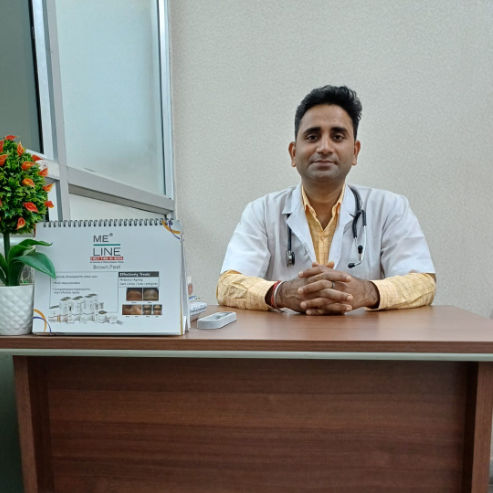Creatinine Test Overview and Details
Learn about the creatinine test, its purpose, procedure, and importance in evaluating kidney function, along with what abnormal results may indicate.

Written by Dr. M L Ezhilarasan
Reviewed by Dr. Dhankecha Mayank Dineshbhai MBBS
Last updated on 29th Aug, 2025

If you’ve ever had a blood or urine test, you may have come across the term creatinine. But what exactly is it, and why is it important? This article will help you understand the creatinine test, why it’s done, what the results mean, and how you can maintain healthy creatinine levels.
What is a Creatinine Test?
A creatinine test measures the level of creatinine in your blood or urine. Creatinine is a waste product produced by your muscles when they break down a compound called creatine phosphate, which provides energy for muscle contractions.
Your kidneys filter creatinine from your blood and remove it from your body through urine. If your kidneys aren’t working properly, creatinine levels in your blood may rise, indicating potential kidney problems.
Consult a Top Nephrologist
Why is the Test Done?
Doctors recommend a creatinine test to:
- Check how well your kidneys are functioning.
- Monitor kidney disease or damage.
- Assess the effectiveness of treatments for kidney disorders.
- Evaluate muscle disorders (since creatinine comes from muscle activity).
Types of Creatinine Tests
There are two main types of creatinine tests:
1. Serum Creatinine Test (Blood Test) – Measures creatinine levels in the blood.
2. Urine Creatinine Test (24-Hour Urine Test) – Measures creatinine levels in urine collected over 24 hours.
Sometimes, doctors also calculate the creatinine clearance, which compares blood and urine creatinine levels to assess kidney filtration rate.
Get Your Health Assessed
Normal Creatinine Levels
Normal ranges vary slightly between labs, but generally:
- For men: 0.7 – 1.3 mg/dL
- For women: 0.6 – 1.1 mg/dL
- Children: Lower than adults (varies with age and muscle mass)
Higher levels may indicate kidney dysfunction, while very low levels could suggest low muscle mass or malnutrition.
Symptoms of High Creatinine Levels
If your kidneys aren’t filtering creatinine properly, you may experience:
- Fatigue
- Swelling in legs, ankles, or face (edema)
- Shortness of breath
- Nausea or vomiting
- Confusion
- Frequent urination or decreased urine output
If you notice these symptoms, consult a doctor for further evaluation.
Causes of High Creatinine Levels
Several factors can increase creatinine levels, including:
Kidney-Related Causes
- Chronic kidney disease (CKD) – Long-term kidney damage.
- Acute kidney injury (AKI) – Sudden kidney failure due to infection, dehydration, or toxins.
- Kidney infections or blockages – Such as kidney stones or urinary tract obstructions.
Non-Kidney Related Causes
- High-protein diet – Excess protein can increase creatinine.
- Intense exercise – More muscle breakdown leads to higher creatinine.
- Dehydration – Less water intake reduces kidney filtration.
- Certain medications – Some antibiotics, NSAIDs (like ibuprofen), and blood pressure drugs can affect creatinine.
How to Lower Creatinine Levels Naturally
If your creatinine is slightly elevated, these lifestyle changes may help:
1. Stay Hydrated
- Drink enough water (unless advised otherwise by a doctor).
- Avoid excessive caffeine or alcohol, which can dehydrate you.
2. Eat a Kidney-Friendly Diet
- Reduce high-protein foods (red meat, dairy, eggs).
- Limit salt and processed foods to ease kidney workload.
- Include fiber-rich foods (vegetables, whole grains).
3. Avoid Overexertion
- Intense workouts can temporarily raise creatinine. Opt for moderate exercise like walking or yoga.
4. Manage Underlying Conditions
- Control diabetes and high blood pressure, which harm kidneys.
- Avoid NSAIDs unless prescribed.
5. Herbal Support (Consult a Doctor First)
- Some herbs like nettle leaf or chamomile tea may help, but always check with a healthcare provider.
When to See a Doctor?
If your creatinine test results are abnormal, your doctor may recommend:
- Repeat testing – To confirm results.
- Additional tests – Like a GFR (Glomerular Filtration Rate) test for kidney function.
- Imaging tests – Ultrasound or CT scan to check kidney structure.
- Nephrologist consultation – If kidney disease is suspected.
How to Book a Creatinine Test?
If you need a creatinine test, you can easily book one through Apollo 24|7. Here’s how:
1. Visit the Apollo 24|7 website or app.
2. Select "Book a Test" and search for "Creatinine Test."
3. Choose between home collection or lab visit.
4. Schedule a convenient time.
Results are usually available within 24-48 hours, and you can discuss them with a doctor online if needed.
Final Thoughts
A creatinine test is a simple yet crucial way to monitor kidney health. If your levels are high, don’t panic, many factors can influence them. Follow your doctor’s advice, stay hydrated, eat well, and keep an eye on symptoms. Early detection and management can help protect your kidneys and overall health.
Consult a Top Nephrologist
Consult a Top Nephrologist

Dr. S Bipin Kumar
Nephrologist
13 Years • MBBS, MD General Medicine, DM, Nephrology
Rajamahendravaram
SG KIDNEY CARE, Rajamahendravaram
Dr Satyanarayana
Nephrologist
6 Years • MBBS,MD,DNB Nephrology
Agartala
Medi Town Multi Speciality Clinic Assam, Agartala

Dr. Siddharth Herur
Nephrologist
4 Years • MBBS, MD General Medicine, DM Nephrology
Kurnool
Medicover hospital and Gurudatta poly clinic, Kurnool

Dr. Anantha Rao
Nephrologist
7 Years • MBBS, DNB (General Medicine), DNB (Nephrology)
Kurnool
Aakash hospital and KIMS hospital, Kurnool

Dr. Govardhan Gupta
Nephrologist
15 Years • MBBS, DNB General Medicine, DrNB Nephrology
Mumbai
Oscar Superspeciality Hospital, Mumbai
Consult a Top Nephrologist

Dr. S Bipin Kumar
Nephrologist
13 Years • MBBS, MD General Medicine, DM, Nephrology
Rajamahendravaram
SG KIDNEY CARE, Rajamahendravaram
Dr Satyanarayana
Nephrologist
6 Years • MBBS,MD,DNB Nephrology
Agartala
Medi Town Multi Speciality Clinic Assam, Agartala

Dr. Siddharth Herur
Nephrologist
4 Years • MBBS, MD General Medicine, DM Nephrology
Kurnool
Medicover hospital and Gurudatta poly clinic, Kurnool

Dr. Anantha Rao
Nephrologist
7 Years • MBBS, DNB (General Medicine), DNB (Nephrology)
Kurnool
Aakash hospital and KIMS hospital, Kurnool

Dr. Govardhan Gupta
Nephrologist
15 Years • MBBS, DNB General Medicine, DrNB Nephrology
Mumbai
Oscar Superspeciality Hospital, Mumbai

